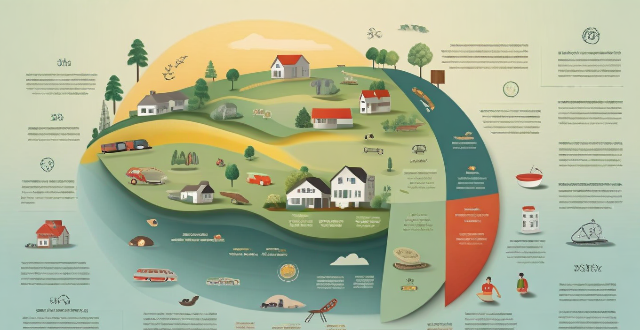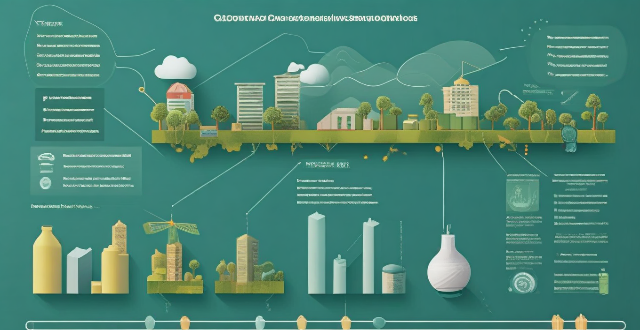Invest Debt

What is climate debt ?
Climate debt is a concept that suggests wealthy nations owe a moral and ecological debt to poorer countries due to their disproportionate contribution to global warming. The idea is based on the principle of "common but differentiated responsibilities," which recognizes that all countries have a responsibility to address climate change, but the extent of this responsibility should be based on historical contributions and capacity to take action. Key points include historical responsibility, capacity to mitigate, and vulnerability and adaptation. Wealthy nations have been industrializing for longer and have more resources to invest in renewable energy, while poorer countries often lack the financial and institutional capacity to adapt to the impacts of climate change. Addressing climate debt is seen as an essential component of any equitable and effective response to the urgent challenge of climate change.

Can developed countries compensate for their climate debt ?
Developed countries have a moral and ethical duty to compensate for their climate debt by acknowledging historical responsibility, providing financial and technical support, and enacting policies that reduce emissions. This is crucial in addressing global inequities and mitigating the impacts of climate change. However, challenges such as quantifying climate debt and political will make compensation complex. International cooperation and agreements are necessary for effective action.

What role do individuals play in addressing climate debt ?
The text discusses the concept of climate debt and the role individuals can play in addressing it. The author outlines six key areas where individuals can make a difference, including understanding the concept of climate debt, reducing personal carbon footprint, supporting sustainable practices, advocating for change, embracing a sustainable lifestyle, and educating future generations about the importance of environmental stewardship. Each section provides specific actions that individuals can take to contribute to reducing climate debt and mitigating the effects of climate change.

How does climate debt affect developing countries ?
The concept of climate debt acknowledges the unequal impact of climate change on developing countries, which have contributed less to the problem but suffer more from its effects. This includes economic losses, social challenges such as health concerns and food insecurity, environmental threats like biodiversity loss and water scarcity, and political and legal issues including migration and international agreements. To address these challenges, initiatives like financial transfers, technology sharing, capacity building, debt forgiveness, and just transition policies are being implemented. Recognizing and supporting the needs of developing nations is crucial for achieving a more equitable and sustainable global future.

What are some proven strategies for long-term wealth accumulation ?
Long-term wealth accumulation is a goal for many individuals, and there are several proven strategies that can help achieve this objective. Here are some of the most effective approaches: 1\. Start Early: The earlier you start saving and investing, the more time your money has to grow through compound interest. 2\. Live Below Your Means: Spend less than you earn and save the difference. 3\. Invest Wisely: Choose investments that align with your goals, risk tolerance, and time horizon. Diversify your portfolio to spread risk and maximize returns. 4\. Pay Off High-Interest Debt: High-interest debt like credit card balances can be a significant obstacle to wealth accumulation. Paying off these debts should be a priority. 5\. Increase Your Income: Increasing your income can provide more resources for saving and investing, which can help accelerate wealth accumulation. 6\. Plan for Retirement: Retirement planning is an essential component of long-term wealth accumulation, ensuring you have enough funds to support yourself during your golden years. 7\. Protect Your Wealth: Ensure that your hard-earned wealth is protected against unexpected events like lawsuits, accidents, or health issues.

How can financial education help prevent debt ?
Financial education is crucial in preventing debt by empowering individuals with the knowledge and skills to make informed financial decisions. It covers understanding personal finance, smart borrowing practices, avoiding common pitfalls, and promoting healthy financial habits. By learning budgeting, saving, investing, credit score management, loan shopping, debt consolidation, and avoiding overspending, predatory lending, and credit card traps, individuals can reduce their risk of accumulating debt and enjoy greater financial stability and independence.

What are the consequences of not addressing climate debt ?
Addressing climate debt is crucial to mitigate environmental degradation, social injustices, and economic instability. Failure to do so exacerbates global warming effects like loss of biodiversity, sea level rise, and extreme weather events. It also leads to inequality, health issues, food insecurity, economic downturn, investment risks, and job losses. Recognizing and addressing climate debt is essential for achieving global sustainability goals and ensuring peace and justice worldwide.

How do I manage debt effectively and pay it off quickly ?
Managing debt effectively and paying it off quickly requires a combination of discipline, strategy, and sometimes professional advice. Here are some steps you can take to get started: ### Assess Your Debt Situation - **Understand Your Debts**: List all your debts and identify high-interest debts. - **Determine Your Budget**: Calculate your monthly income and evaluate your expenses. ### Create a Debt Repayment Plan - **Choose a Repayment Method**: Avalanche or Snowball method. - **Make a Budget and Stick to It**: Allocate more funds to debt repayment and adjust as needed. - **Consider Refinancing Options**: Consolidate debts or negotiate with creditors. ### Implement Additional Strategies - **Increase Your Income**: Take on additional work or sell unwanted items. - **Reduce Your Expenses**: Cut out luxury spending and shop smarter. - **Improve Your Credit Score**: Pay on time and monitor your credit report. ### Seek Professional Advice if Needed - **Consult a Financial Advisor**: Personalized advice and debt management plans. - **Consider Debt Counseling**: Nonprofit credit counseling and beware of scams. Consistency and perseverance are key in paying off debt quickly.

What is the difference between credit management and debt collection ?
Credit management and debt collection are two distinct processes that involve handling financial transactions between a business and its customers. While both are crucial for maintaining a healthy cash flow, they serve different purposes and require different approaches. Credit management refers to the process of managing the risks associated with extending credit to customers, while debt collection involves recovering outstanding debts from customers who have failed to make payments as agreed upon. Both processes are essential for maintaining a healthy cash flow and ensuring the financial stability of a business.

How do low-income countries manage their debt and avoid falling into a debt trap ?
文章讨论了低收入国家在管理债务方面面临的挑战,并提出了避免陷入债务陷阱的策略。这些策略包括:将债务管理作为经济政策的重点;多元化融资来源;与债权人协商优惠条件;建设机构能力;促进经济增长和发展。通过实施这些策略,低收入国家可以有效管理债务,实现可持续经济发展。

Who is responsible for paying off the climate debt ?
The concept of "climate debt" refers to the cumulative emissions of greenhouse gases by developed countries, which have contributed significantly to global warming and its associated impacts. This debt implies a moral and ethical obligation on the part of these countries to take action to mitigate and adapt to climate change, as well as to support developing nations in doing the same. Key Points: - Historical Emissions: Developed countries are primarily responsible for climate change due to their long history of high GHG emissions. - Economic Capacity: Wealthier nations have greater financial resources to invest in climate solutions. - Technology and Innovation: Developed countries often lead in technological advancements that can help reduce emissions and build resilience. - International Agreements: Under the United Nations Framework Convention on Climate Change (UNFCCC), developed countries have committed to providing financial and technical support to developing countries. - Loss and Damage: Developing countries, especially those most vulnerable to climate impacts, require assistance from wealthier nations to cope with losses and damages. - Equity and Justice: Addressing the climate debt is a matter of intergenerational and international equity and justice.

What are the common mistakes people make when trying to achieve financial freedom ?
Achieving financial freedom is a goal for many, but it's not always easy. Along the way, people often make mistakes that can hinder their progress. Here are some of the most common errors: ## 1\. Not Having a Clear Plan One of the biggest mistakes people make is not having a clear plan for achieving financial freedom. Without a roadmap, it's easy to get sidetracked or lose motivation. * **Solution**: Create a detailed plan that outlines your goals, timeline, and strategies for achieving them. ## 2\. Spending Beyond Their Means Many people fall into the trap of spending more than they earn, which leads to debt and financial stress. * **Solution**: Live below your means by budgeting, tracking expenses, and cutting unnecessary costs. ## 3\. Not Investing in Their Future Failing to invest in long-term goals like retirement or building wealth can set people back years or even decades. * **Solution**: Start investing early and regularly, even if it's just a small amount each month. ## 4\. Ignoring Debt Repayment Carrying high-interest debt can be a major obstacle to achieving financial freedom. * **Solution**: Prioritize paying off high-interest debt as soon as possible. ## 5\. Lacking Diversification in Investments Putting all your eggs in one basket can be risky. Many people make the mistake of not diversifying their investments. * **Solution**: Spread your investments across different asset classes to reduce risk. ## 6\. Not Educating Themselves About Finance A lack of financial knowledge can lead to poor decision-making and missed opportunities. * **Solution**: Educate yourself about personal finance through books, courses, and other resources. ## 7\. Failing to Review and Adjust Financial Plans Life changes, and so should your financial plans. Many people forget to review and adjust their strategies over time. * **Solution**: Regularly review your financial situation and adjust your plans accordingly.

Can anyone achieve financial freedom ?
Financial freedom, a state where one's passive and active income covers living expenses without regular time-for-money exchanges, is a goal many strive for. Key factors for achieving it include education, saving habits, smart investing, debt management, multiple income streams, avoiding lifestyle inflation, long-term planning, and the right mindset. Actionable steps include budgeting, automated savings, early investing, continuous learning, and networking with like-minded individuals. While not everyone may achieve financial freedom due to varying circumstances, it is attainable for those who are committed and strategic in their approach.

What is the best way to invest in gold ?
This article explores the best way to invest in gold, discussing why one might want to consider adding gold to their portfolio and outlining different ways to invest in gold, such as physical gold, gold stocks and mutual funds, gold ETFs, and gold futures and options. The advantages and disadvantages of each method are discussed, and it is emphasized that the best way to invest in gold depends on individual investment goals, risk tolerance, and personal preferences.

How can we ensure that climate debt is taken seriously by governments and corporations ?
Climate debt, a concept recognizing the cumulative GHG emissions primarily from industrialized nations and their impacts on vulnerable populations, calls for action. Strategies to ensure its serious consideration by governments and corporations include raising public awareness, implementing policy initiatives, utilizing financial mechanisms, enhancing international cooperation, promoting corporate responsibility, fostering innovation, ensuring accountability, and engaging in socially responsible actions. These efforts aim to create an environment where stakeholders actively work towards mitigating climate change's impacts.

How much money should I invest in cryptocurrencies ?
Investing in cryptocurrencies has become a popular trend, but determining how much money to invest can be challenging. Factors such as risk tolerance, investment goals, market conditions, and the need for diversification should be considered before making any investment decisions. It is important to carefully consider these factors and only invest what you are comfortable losing, as investing in cryptocurrencies carries risks.

What are some effective personal finance management strategies ?
Managing personal finances effectively is crucial for achieving financial stability and long-term success. Here are some effective personal finance management strategies: 1. Create a budget that tracks income, expenses, savings, and adjustments. 2. Build an emergency fund with at least 3-6 months' worth of living expenses in a high-yield savings account or money market fund. 3. Pay off high-interest debt using the snowball or avalanche method. 4. Invest for long-term goals by starting early, diversifying, and staying consistent. 5. Protect your finances with health insurance, disability insurance, and life insurance. 6. Plan for retirement by starting early, maximizing contributions, and investing wisely. 7. Educate yourself through reading books, taking courses, and seeking professional advice.

How can we reduce our carbon footprint to minimize our contribution to climate debt ?
To minimize our contribution to climate debt, we canTo minimize our contribution to climate debt, we can several actions: using renewable energy we can reduce our carbon footprint through several actions: using renewable energy sources like solar and wind power; reducing energy consumption by unplugging unused appliances and optimizing home insulation; practicing sustainable transportation such as carpooling, using public transit, cycling, or walking; reducing waste and recycling by composting organic waste and reusing items; and supporting sustainable practices including buying local produce and choosing eco-friendly products. These conscious choices help us significantly lower our environmental impact and move towards a more sustainable future.

How do I invest my money wisely for long-term growth ?
Investing wisely for long-term growth involves setting financial goals, creating a diversified portfolio, considering risk tolerance, investing for the long-term, and monitoring investments regularly.

How can individuals invest in clean energy projects ?
Investing in clean energy projects is a way to support sustainable development and fight climate change. Individuals can invest through renewable energy mutual funds, green bonds, direct investment in clean energy companies, community solar projects, and sustainable real estate investments. Examples include iShares Global Clean Energy ETF (ICLN), Toyota Green Bond, and Eco-friendly apartment complexes.

How can I invest in stocks with a minimal risk ?
How to Invest in Stocks with Minimal Risk Investing in stocks can be risky, but there are strategies to minimize these risks. Diversification across stocks, sectors, and asset classes is crucial. Dollar-cost averaging helps smooth market fluctuations. Stop-loss orders limit potential losses. Long-term investing allows for market recoveries. Understanding the companies you invest in reduces unknown risks. Start small and learn as you go, staying informed about financial news. Working with a financial advisor can provide personalized guidance. Remember, no investment is completely risk-free, so assess your comfort level before making decisions.

What is the best cryptocurrency to invest in ?
The article provides a summary of the best cryptocurrencies to invest in, including Bitcoin (BTC), Ethereum (ETH), Binance Coin (BNB), and Cardano (ADA). It highlights the pros and cons of each cryptocurrency, such as high liquidity and widespread adoption for Bitcoin, smart contract functionality and a large developer community for Ethereum, usefulness on the Binance exchange and a burn mechanism for Binance Coin, and a strong academic foundation and focus on security and sustainability for Cardano. The conclusion emphasizes the importance of considering factors such as liquidity, adoption, and potential for growth when choosing a cryptocurrency to invest in, and encourages readers to do their own research before making an investment decision.

How do I invest in the stock market ?
The text provides a step-by-step guide on how to invest in the stock market. It emphasizes the importance of education, determining investment goals, choosing a strategy, opening a brokerage account, selecting investments, monitoring them, and maintaining patience and discipline. The process involves learning about different types of stocks, understanding risks, diversification, and risk management. It also includes researching brokerage firms, funding an account, choosing individual stocks or mutual funds based on company performance, and staying informed about market changes. Overall, the text encourages potential investors to approach stock market investing with careful planning and research to achieve their financial goals over time.

Is it safe to invest in cryptocurrency as a financial product ?
Is it safe to invest in cryptocurrency as a financial product? The answer is not straightforward, as there are both risks and potential benefits associated with this type of investment. On the one hand, cryptocurrencies are known for their high volatility, lack of regulation, and security risks, which can make them a risky investment. On the other hand, investing in cryptocurrency can potentially yield high returns, offer decentralization, and be accessible to investors. Ultimately, it is important to carefully consider the risks involved before making any investment decisions and to only invest what you are willing to lose. As with any investment, it is recommended to do your own research and consult with a financial advisor before making any decisions regarding cryptocurrency investments.

Can I invest in financial products with a small amount of money ?
Investing in financial products with a small amount of money is possible and can be beneficial for long-term wealth growth. Minimum investment requirements vary among different financial products, but options like robo-advisors, micro-investing apps, online brokerages, ETFs, and direct stock purchases allow for low minimum investments. Starting small helps manage risk, build discipline, and take advantage of compound interest. Tips for investing small include setting clear goals, educating oneself, diversifying the portfolio, considering fees and taxes, and staying patient and disciplined.

How much should I invest in each type of asset class ?
The text provides a guide on how to determine the allocation of funds across different asset classes based on investment goals, risk tolerance, time horizon, and financial situation. It suggests that younger investors should allocate more towards stocks while older investors should gradually shift towards safer investments. The text also emphasizes the importance of regularly reviewing and rebalancing the portfolio and seeking professional advice when unsure about investment decisions.

Is it better to save or invest money for wealth growth purposes ?
The age-old debate of whether to save or invest money for wealth growth purposes largely depends on individual circumstances, risk tolerance, and financial goals. Saving offers security and stability but low returns, while investing carries more risk but has the potential for higher rewards. The best approach for most individuals is a balance between saving and investing, with strategies such as establishing an emergency fund, allocating for short-term goals, investing for long-term goals, and regularly re-evaluating financial plans.

What are some examples of successful climate debt repayment programs ?
Climate debt repayment programs aim to address the disproportionate impact of climate change on vulnerable communities and countries. Successful programs include the Green Climate Fund, Global Environment Facility, World Bank's Climate Investment Funds, and African Development Bank's Africa Adaptation Initiative. These programs provide financial support and resources for adaptation, mitigation, and sustainable development projects in developing countries. Key features include funding for biodiversity conservation, land degradation prevention, private sector involvement, and disaster risk reduction.

How do I invest in tech stocks as a beginner ?
Investing in tech stocks can be a profitable venture, but it's important to approach it with caution and knowledge. Here are some steps to help you get started: 1. Educate yourself on the basics of the stock market and the technology sector. 2. Set investment goals based on your risk tolerance and desired returns. 3. Choose a reputable brokerage firm that offers access to the stock market. 4. Research individual tech stocks by looking at financial statements, earnings reports, and news articles. 5. Diversify your portfolio by investing in multiple tech stocks across different industries and companies. 6. Monitor your investments and stay informed about industry developments and company news. 7. Remember that investing in stocks involves risks, including the possibility of losing money. Do your own research and consult with a financial advisor before making any investment decisions.

What are the benefits of investing in private equity ?
Investing in private equity offers higher potential returns, diversification benefits, active management and control, access to unique opportunities, tax efficiency, and a disciplined approach to investing. However, it also comes with risks such as illiquidity, high entry barriers, and the need for specialized knowledge. Proper due diligence and consideration of one's overall investment objectives and risk tolerance are essential before committing capital to private equity.